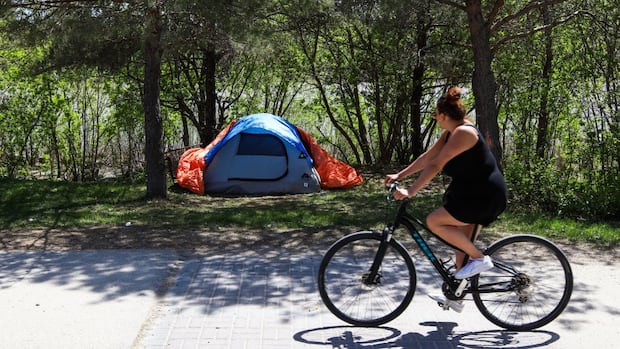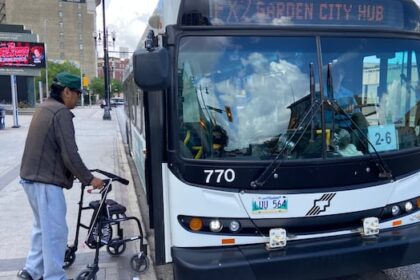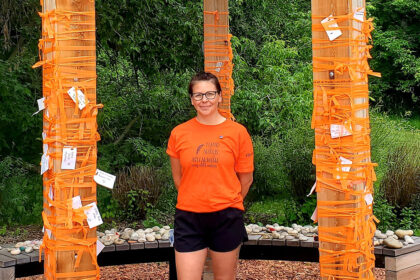ManitobaAn organization that works to combat homelessness says its most recent street census indicates there are more unhoused people living in Winnipeg than at any point since the surveys began in 2015.More than 2,400 people in Winnipeg identified as unhoused in NovemberDave Baxter · CBC News · Posted: Aug 26, 2025 9:46 PM EDT | Last Updated: 4 hours agoA cyclist rides past a tent near Waterfront Drive in Winnipeg earlier this year. End Homelessness Winnipeg’s latest street census found that in November, there were at least 2,469 people experiencing homelessness in the city. (Prabhjot Lotey Singh/CBC)An organization that works to combat homelessness says its most recent street census indicates there are more unhoused people living in Winnipeg than at any point since the surveys began in 2015.On Tuesday, End Homelessness Winnipeg released preliminary results of its 2024 Winnipeg street census, which saw volunteers head out onto the streets to collect homelessness data in the city over a seven-day period last November.A total of 160 volunteers visited encampments and designated routes at service provider locations in the city. The survey also collected administrative data on homelessness. The point-in-time survey, conducted roughly every two years, is intended to provide a snapshot of how many people are experiencing homelessness in shelters and on the streets during the census period.Last November’s survey found there were at least 2,469 people experiencing homelessness in Winnipeg as of Nov. 5, 2024 — the highest number recorded since the organization began doing the census in 2015. It also shows a dramatic increase from the organization’s last survey, conducted in November 2022, which identified 1,256 homeless people counted over a 24-hour period. While the survey aimed to find out how many people are unhoused, it also dug deeper into which groups and demographics are most affected by homelessness in Winnipeg. It found the vast majority of those who are homeless are Indigenous, with 62 per cent of those included in the survey saying they were First Nations, and Métis accounting for another 15 per cent. Those numbers are a “powerful reminder of ongoing systemic inequities,” End Homelessness Winnipeg said.The survey also calls the child welfare system a “common pathway to homelessness,” with almost 50 per cent of respondents saying they had been involved with Child and Family Services in some way. The average age of those experiencing homelessness in Winnipeg was 41, according to the survey, with 52 per cent being age 30-49, another 25 per cent age 50 and over, and youth ages 16-29 making up 22 per cent. The survey also found a significant rise in newcomers who are homeless, with 13 per cent of those who were unhoused in Winnipeg identifying as newcomers to Canada, up from approximately two per cent in 2022.An encampment along the banks of the Red River near The Forks is seen in 2023. ‘The cost of housing and mental health are huge barriers to finding and maintaining housing,’ End Homelessness Winnipeg’s survey says. (Dave Baxter/CBC)People were also asked in the survey what they feel are the top things they would need to find a suitable home. A majority — 82 per cent — said more affordable housing. Respondents also listed mental health supports and housing with built-in supports as ways to end homelessness. “The cost of housing and mental health are huge barriers to finding and maintaining housing,” the survey states. “Thus, strategies to address homelessness should prioritize increasing income supports, developing barrier-free low-income housing,and increasing culturally appropriate mental health and addiction supports.”Survey results released Tuesday are only preliminary, according to End Homelessness Winnipeg. The organization plans to release full survey results at a Thursday media event.In January, the province introduced its homelessness strategy, which the NDP government says aims to end chronic homelessness in Winnipeg by 2031. Part of the plan involves moving people out of encampments and into housing.The province also said in January it will spend $20 million over the next two years as it works to buy up apartment buildings it intends to turn into 300 social housing units.The province said last month that a total of 59 people have been placed into housing since the strategy was introduced. ABOUT THE AUTHORDave Baxter is an award-winning reporter and editor currently working for CBC Manitoba. Born and raised in Winnipeg, he has also previously reported for the Winnipeg Sun and the Winnipeg Free Press, as well as several rural Manitoba publications.
Thursday, 5 Feb 2026
Canada – The Illusion
Search
Have an existing account?
Sign In
© 2022 Foxiz News Network. Ruby Design Company. All Rights Reserved.
You May also Like
- More News:
- history
- Standing Bear Network
- John Gonzalez
- ᐊᔭᐦᑊ ayahp — It happened
- Creation
- Beneath the Water
- Olympic gold medal
- Jim Thorpe
- type O blood
- the bringer of life
- Raven
- Wás’agi
- NoiseCat
- 'Sugarcane'
- The rivers still sing
- ᑲᓂᐸᐏᐟ ᒪᐢᑿ
- ᐅᑳᐤ okâw — We remember
- ᐊᓂᓈᐯᐃᐧᐣ aninâpêwin — Truth
- This is what it means to be human.
- Nokoma











